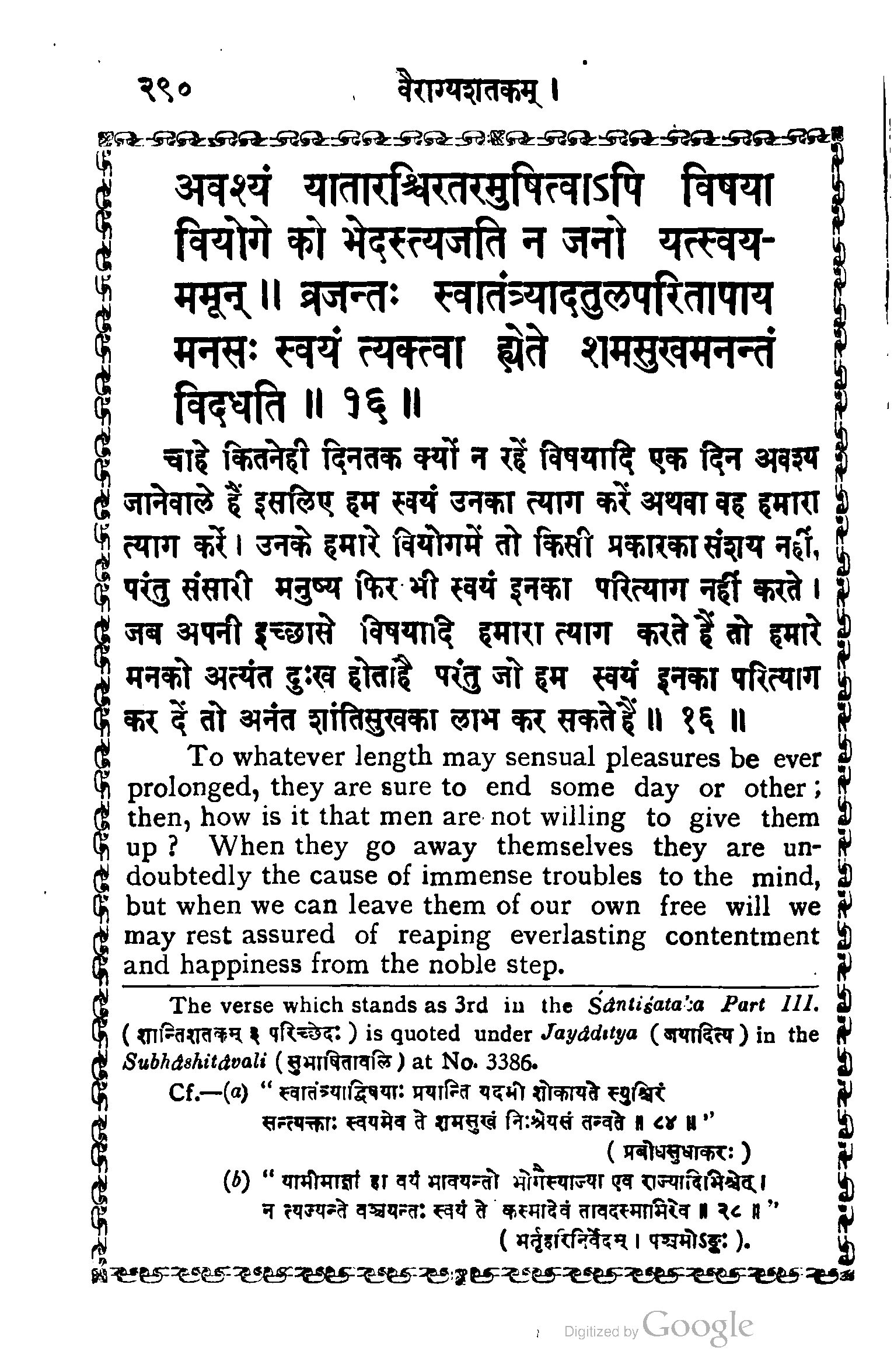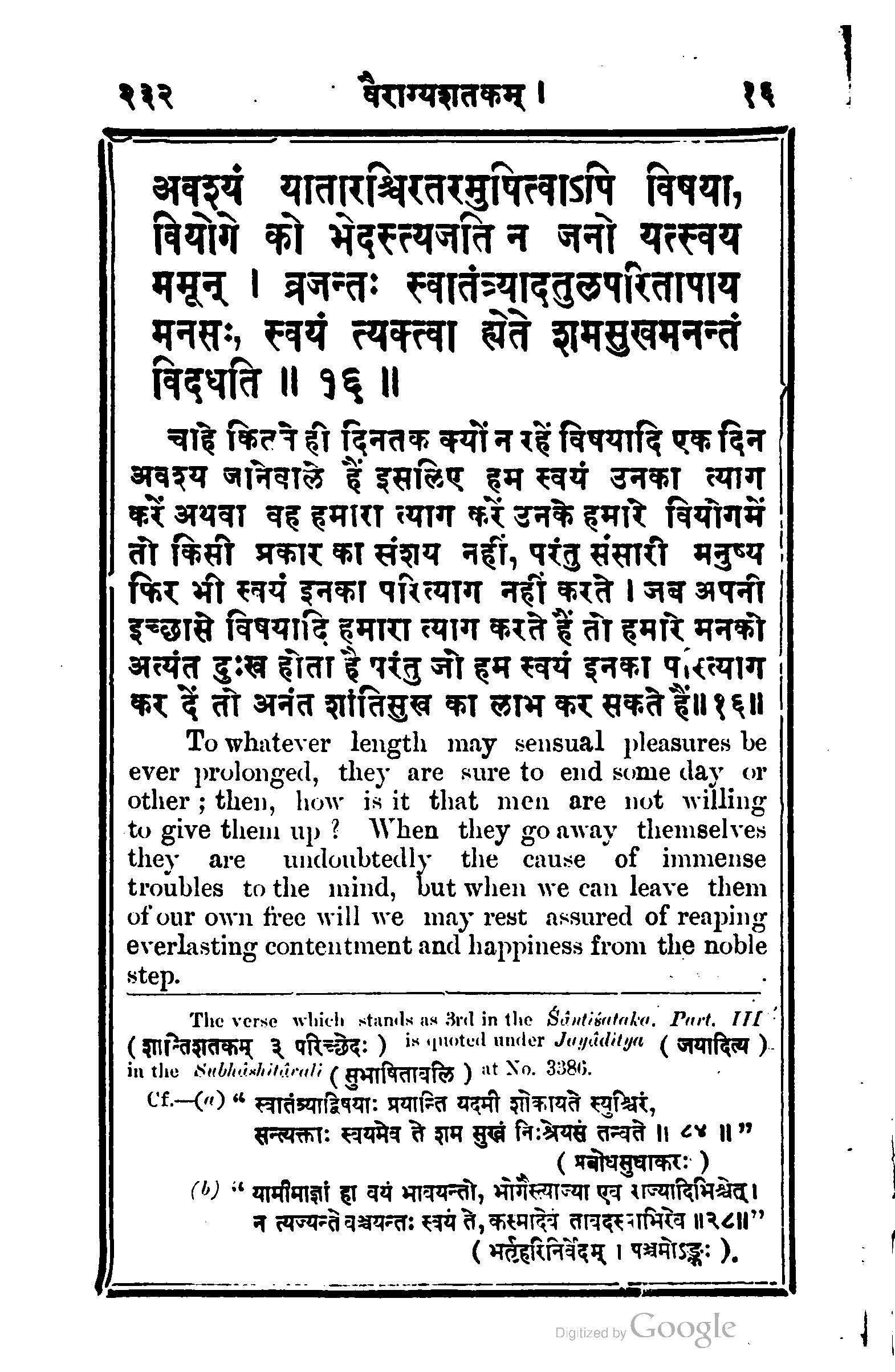Ryder
Tawney
More
Mādhavānanda
Telang
verse

Text (not proofread)
अवश्यं यातारश्चिरतरमुषित्वापि विषया
वियोगे को मेदत्यजवि न जनो यत्स्वयममून् ।
व्रजन्तः स्वातन्त्र्यादतुलपरितापाय मनसः
स्वयं त्यक्ता होते शमसुखमनन्तं विदधति ॥ १६ ॥
footnote

Text (not proofread)
XVI . ( a ) पि ; च A. ( c ) ° जन्त : ; जेल A. ( d ) °° ; शे ° A. स्त्वे ०
K. Bo . ( orig . Bo.n. ) ० ० G. ति ; ° ३ . P. R.
endnote

Text (not proofread)
St. XVI. seems to answer to स्वयं त्यक्ता in the fourth
line meaning voluntary separation . The commentary introduces
the third line thus ननु गमनशीलत्वात्स्वयमेव यास्यन्ति को लाभस्तत्त्यागे इत्याश
FIRE || Hautarera . For the dative see Siddh . Kaum . I. , 280. For
the last line comp . Gîtâ chap . II . , 70 et seq . The Stanza occurs
at p . 311 of the Kavyasangraha.S'ikharini .
Kosambi
verse


Text (not proofread)
अवश्यं यातारश् चिरतरमुषित्वापि विषया
वियोगे को भेदस् त्यजति न जनो यत् स्वयममून् ।
व्रजन्तः स्वातंत्र्यादतुलपरितापाय मनसः
स्वयं त्यक्ता ह्येते शमसुखमनन्तं विदधति ॥ १५७ ॥
footnote


Text (not proofread)
157 Om . in NS2 . ( a ) C चिरपरिचिताश्चापि ; J X Y 2 चिरपरिगृहीताश्च ; F2
चिरतरमुषित्वा च . Eat . at विषयान् . - S 0 ) B2 वेदस् ; G 1 हेतुसू ( for भेदस् ) . Fat.v. न मनो ;
W2 -4 व जनो ( for न जनो ) . A3 DW4 यस्त्वयममून् ; C F3 यत्स्वयमसून ; F2 यत्स्वयमभूत् ;
F½ ( m.v. as in text ) यत्स्वयमपि . - c ) F2 व्रजेतं ; G० व्रजंत्य : Ms मनसां . d d . ) X सुखं
( for स्वयं ) . DE 1 5 F3.5 J1 W1 . 2. 4 T3 Gst . 4 त्यक्त्वा . W 2 चेदेते ; Ws चेत्ते ; W + चेते
( for होते ) . B1 शिवसुखम् ; B2 शममुषम् ; I [ s १ ] समसुखम् ; 5 C श्रमसुखम् Hat , a , st
M.8 विदधते .
BIS . 668 ( 243 ) Bhartr ed . Bohl . 3. 13. Haeb and Galan . 12. SRB . p . 368 .
42 ( Jayāditya ) ; SBH . 3386 ( Jayaditya ) ; SDK . 5. 62. 5 ( p . 318 , Hari ) . Šāntiś .
3. 3 ; SS . 45. 11 ; SM . 1444 ; SN . 308 ; SSD 4. f . 23a ; SSV . 1429 ; JSV . 239. 2 .

